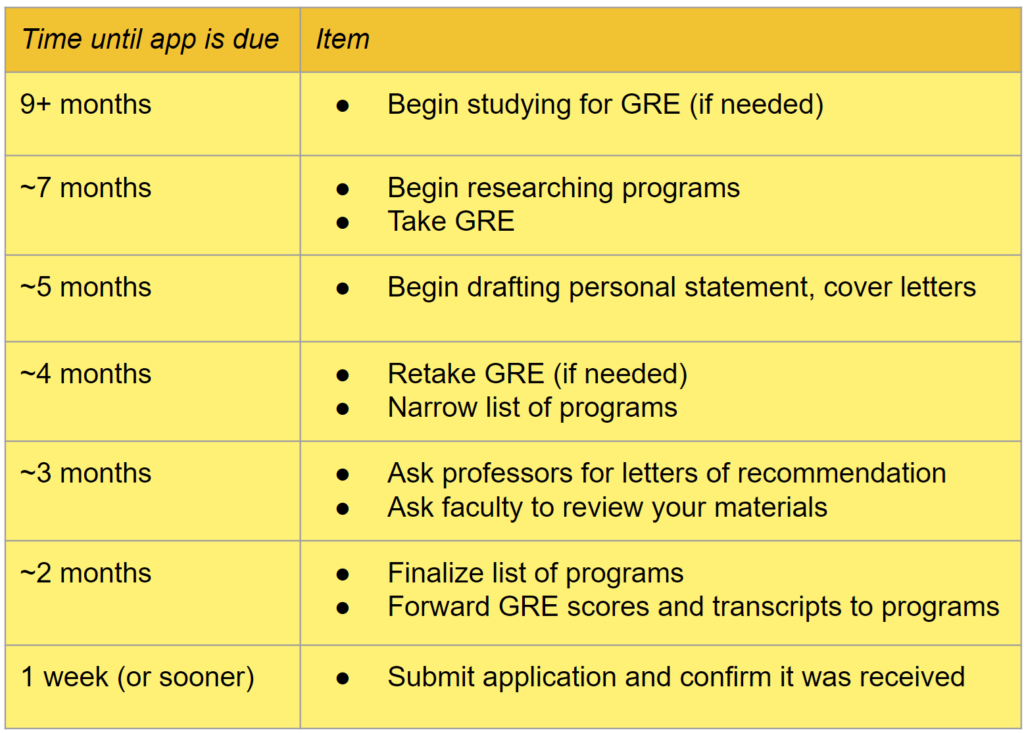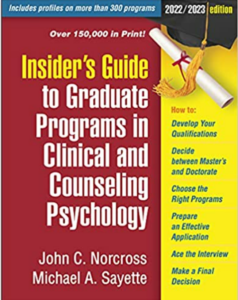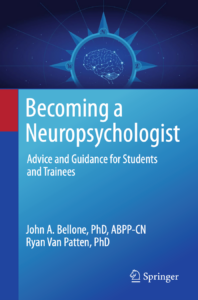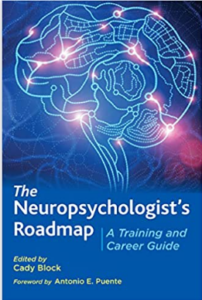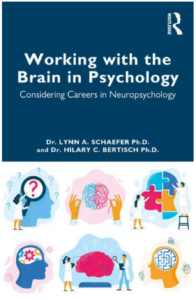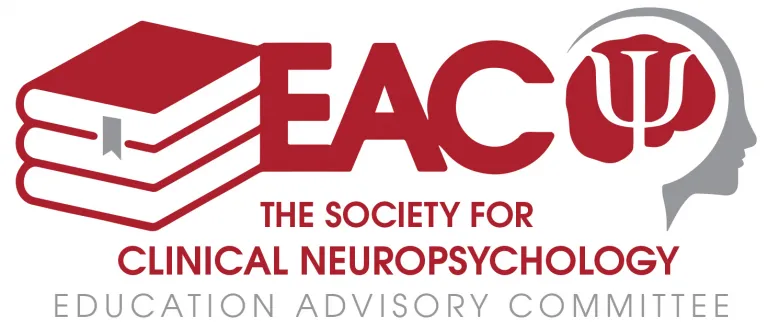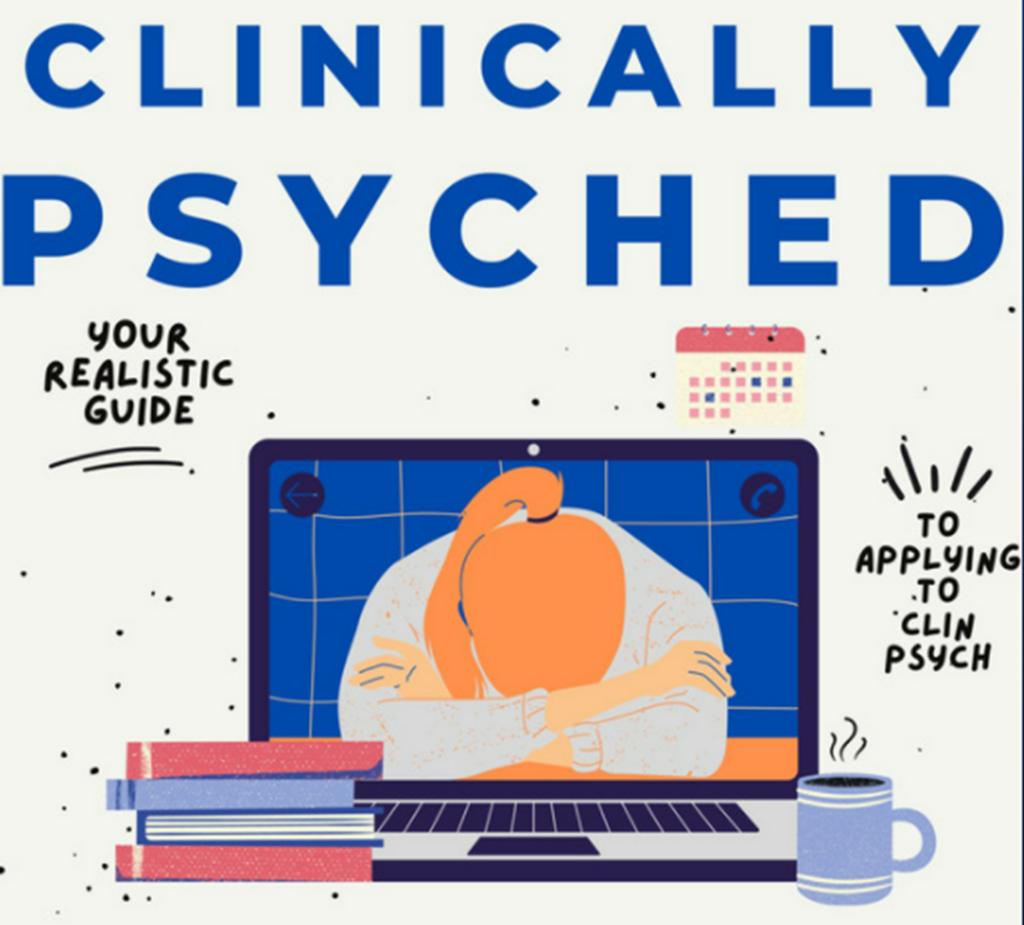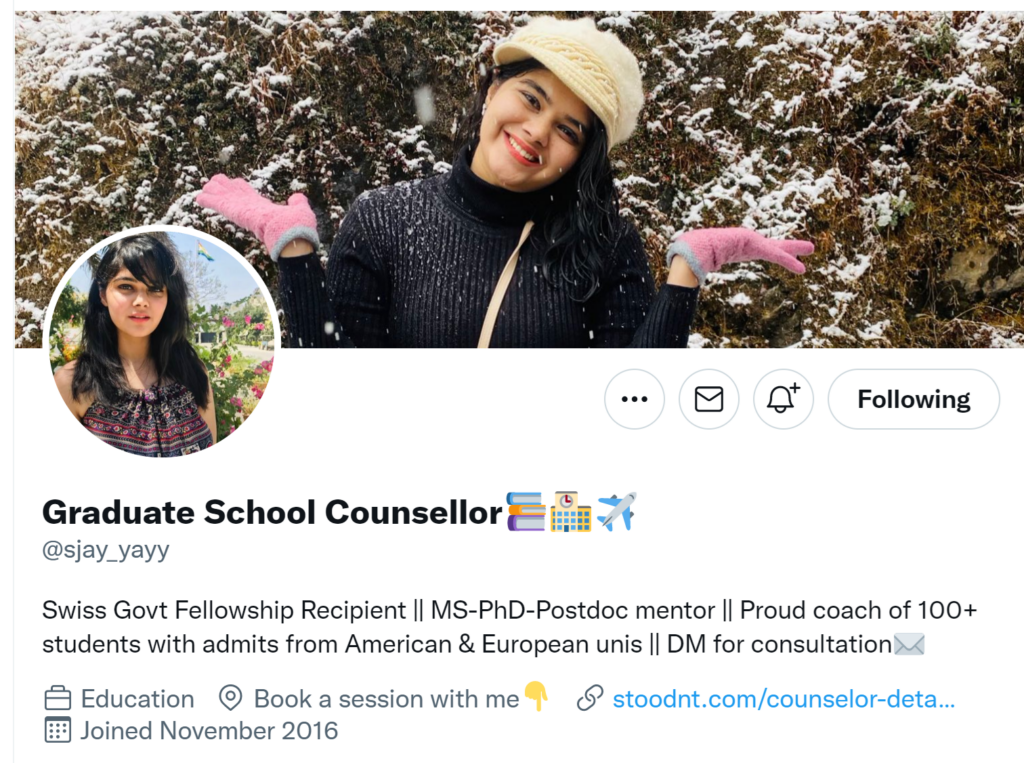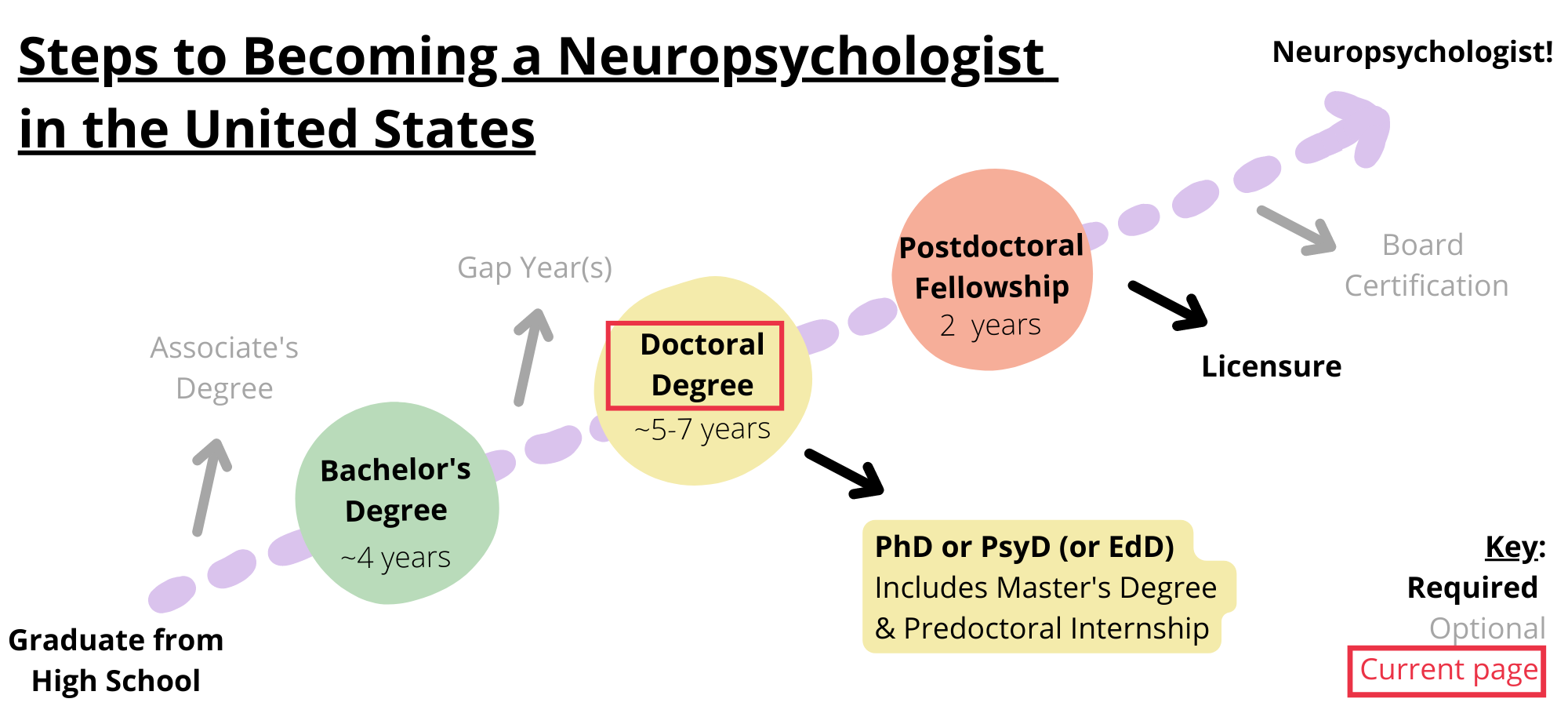
Doctoral Degree
After completing your bachelor’s degree (and maybe taking a gap year or two), the next step in your education is to complete a psychology doctoral degree. Most neuropsychologists in the United States have a PhD in Clinical Psychology, and some instead have a PsyD in Clinical Psychology. (A PhD is a “Doctor of Philosophy” and a PsyD is a “Doctor of Psychology”). Other options include a PhD or PsyD in Counseling Psychology or (rarely) an EdD in School or Counseling Psychology.
Click the tabs below to learn more about earning a doctoral degree in psychology:
Whereas both prepare you to be a clinician (i.e., to work directly with patients), the PhD degree tends to incorporate more research training than the PsyD. Here are some additional differences between PhD and PsyD programs:
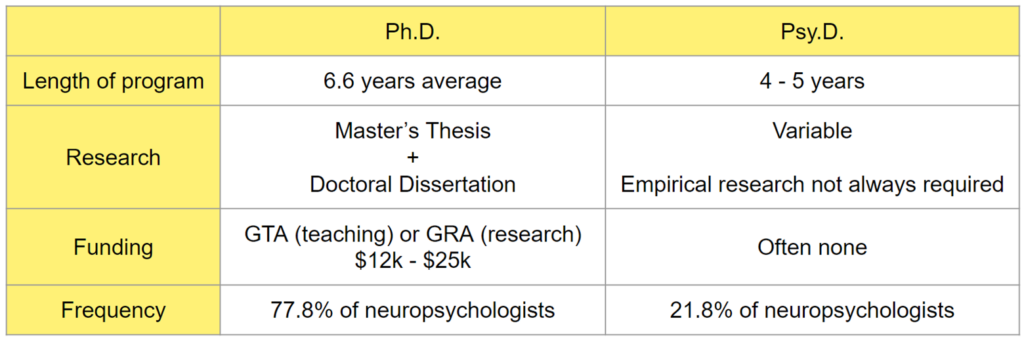
Doctoral programs can be further broken down based on the following models:

- The “Clinical Science” model
- These are programs with the most emphasis on research, but less so on direct patient care. They best prepare you for an academic career (e.g., as a full-time professor or researcher).
- The “Scientist-Practitioner” model (AKA the “Boulder” model)
- These are programs that balance research and clinical training. They prepare you to be proficient both in conducting your own research and translating that research to your patient care (and also translating what you observe from working with patients to inform your research!)
- *Most programs that offer a PhD in Clinical Psychology adhere to this model.
- The “Practitioner-Scholar” model (AKA the “Vail” model)
- These are PsyD programs, and they have the most emphasis on clinical training and the least on how to conduct your own research. They prepare to you to be consumers of scientific research and to conduct high-quality, evidence-based patient care.
No matter which model your program adheres to, your time during a clinical or counseling psychology doctoral program will typically include some arrangement of:
(a) taking classes
(b) conducting research (a thesis and dissertation)
(c) clinical training (learning how to work with patients)
While you are being trained broadly as a psychologist, you can begin to specialize in neuropsychology during your doctoral program through all 3 of these activities. For example, you may take classes in neuropsychological assessment, conduct research about brain functioning, and work with patients in a neuropsychology clinic (e.g., as a psychometrist).
- Thesis
- The first milestone in your doctoral program is typically to complete and orally defend a thesis (research) project, allowing you to earn your Master’s degree.
- Note: If you already completed a terminal Master’s degree in psychology prior to entering a doctoral program, you may be able to skip or streamline this step (but be sure to do your research on this, as the requirements vary by doctoral program!)
- Written Exams
- The second major milestone in your doctoral program is to pass written exams (referred to as “qualifying”, “preliminary”, or “comprehensive” exams). This will allow you to become a qualifying student for the doctoral degree.
- Dissertation
- The third major milestone in your doctoral program is to complete and orally defend your dissertation, which is another (typically more advanced) research project. Most programs also include an oral examination at the time of your dissertation defense.
- Predoctoral Internship:
- The final year of your doctoral program is a Predoctoral Internship during which you work at a clinic or hospital and fill remaining gaps in your training. Read more about the Predoctoral Internship here.
Applying to doctoral programs in psychology is a very intensive and competitive process, and many students have to try a couple times before they are successfully admitted to a program. For support and guidance in this process, we highly recommend that you connect with a mentor, and fortunately there are many mentorship programs available for individuals interested in applying to graduate school for psychology and neuropsychology! Find a mentor here!
The Society for Clinical Neuropsychology (SCN) has a great tool you can use to begin your search for doctoral programs in the United States and Canada that have specialty courses and experiences in neuropsychology. Click here to begin searching!
The programs listed in the SCN search tool are not the only programs where you can get training in neuropsychology. Other free resources to search for doctoral programs include APA’s list of accredited programs, the National Matching Service’s list of doctoral programs eligible to participate in the Association of Psychology Postdoctoral and Internship Centers (APPIC) match program, and a Google Map of APA-accredited programs.
APA also offers a tool to search and compare admissions information for Masters and doctoral programs at over 300 schools in the United States and Canada for a subscription fee.
Once you’ve found programs you’re interested in applying to, it’s a good idea to keep track of key information about the program (e.g., applications fees and deadlines, admissions data, faculty you may be interested in working with, etc.) in a spreadsheet. You can download a copy of a sample organizational spreadsheet for tracking doctoral programs.
These instructions are meant to be a useful starting point for your emails to potential advisors, but it is not the only way to approach this important step in the graduate school application process! Please continue consulting with your personal mentors and adapt these instructions to fit your interests, personality, and any specific guidance you receive from supervisors or advisors.
Instructions:
1) Double check that your email address, signature line, and profile photo are what you want them to be before emailing a potential advisor. Having your full name linked to your email account is one way to help prevent your email from being bounced into a spam folder.
2) Use a clear and succinct subject line:
- “Potential applicant question”
- “Prospective PhD student question”
3) Briefly introduce yourself:
- “I am a senior at Generic University majoring in psychology with a minor in public health, and am planning on applying to Clinical Psychology PhD programs this cycle. I am emailing because I am interested in applying to work with you.”
- Or… “I am a research assistant in the Generic PI lab at Generic Institute and am preparing applications to Social Psychology PhD programs for the upcoming academic year. I believe that my research interests may be a strong fit with your lab and would like to introduce myself.”
4) State your specific interest in the advisor/their lab, using information from their lab website, recent published articles, or other online material to show that you’ve done your due diligence and have a specific interest in their work:
- “I saw on your lab website that you recently began implementing EEG into your study protocols, which is of great interest to me because I have worked with EEG throughout my undergraduate research with Generic PI in a study about cognitive control in individuals with sleep disorders.”
- “I read your recent paper on cultural considerations in PTSD treatment and it sparked many ideas for how to address bilingualism in the clinical context, which is of particular interest to me because I am bilingual in English and Punjabi.”
5) Describe any personal connections that you may have:
- “I spoke to your current student, Generic Name, and they recommended that I reach out to you directly.”
- “My current supervisor, Generic PI, collaborated with you when you were both post-docs back at Generic Institute, and they said that you are a great person to work with.”
6) Make a specific request or ask a specific question. Be sure that this is not something that could have been easily answered by reading the faculty’s lab website!
- “I am wondering if you would be available to talk over the phone or video conference about the current direction your lab is headed in, and whether my interest in geriatric medication adherence would be a good fit with your lab.”
- “I am wondering if you are planning to take a graduate student for the 2021-22 academic year.”
7) Attach your CV to the email
- “My CV is attached for your convenience.”
8) Conclude
- “Thank you for your time and consideration, and I look forward to hearing back from you.”
If you’re an international student interested in applying to Clinical Psychology programs in the United States, check out this great resource hub with advice about navigating the admissions process and finding funding opportunities: Click here for more information!
This fantastic resource was prepared by Julie Cristello, MS, Leanna Kalinowski, MA, Molin Shi, PhD, and Xin “Alisa” Zhao, PhD.
Visit again soon to download a N2N template for making your CV.
Additional resources for aspiring and current graduate students:
American Psychological Association: Becoming a Psychological Scientist Video Series
This APA page includes video presentations, recorded Q&As, and panel discussions that aim to help you “successfully apply to graduate school and help diversify the field”.
Examples:
- “Top Things to Know as You Apply to Graduate School”
- “Write a Compelling Application Statement”
- “Selecting a Program that is a Good Fit for You”
Visit the Society for Clinical Neuropsychology (SCN), Education Advisory Committee (EAC) website
The SCN EAC website has many useful tipsheets to guide you through the steps of earning a doctoral degree in psychology, with a focus in neuropsychology.
Listen to the "Clinically Psyched" podcast
“Clinically Psyched” is a podcast all about helping Clinical Psychology graduate school applicants.
Listen to their podcast here on Spotify
Follow them on Twitter to learn more: @PodPsyched
Access resources through "Psychin' Out"
“Psychin’ Out is a global resource hub of aspiring and current psych researchers and practitioners (i.e., Master’s students, Doctoral trainees, etc.) supporting each other.
Together, we dismantle barriers that make training programs and our field exclusive, inaccessible, and ineffective.”
View their resource hub here
Follow them on Twitter to learn more: @PsychinOut
Follow Sanya Jain, the "Graduate School Counsellor", on Twitter
Follow Sanya on Twitter for great tips and resources related to successful application to graduate school!
Listen to the "Dear Grad Student" podcast
“Dear Grad Student” is a weekly podcast for all grad students. Episodes consist of conversations about students’ Day in the Life, Diverse Identities and Racism in Academia, and themed episodes (like, Mental Health in Grad School, fieldwork, and Finances).
Watch this video by APA on "Guidance for Students with Disabilities"
Find additional video’s on APA’s website, here!

